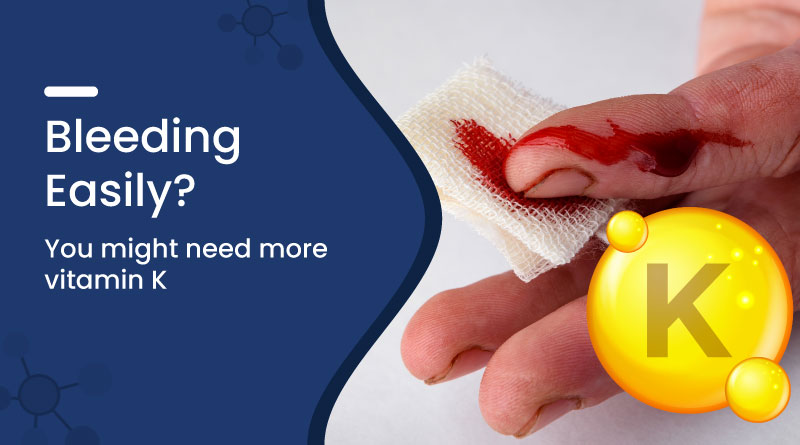Vitamin K Deficiency: Causes of Easy Bleeding & How to Fix It


If you’re bleeding easily, getting frequent nosebleeds, or noticing bruises that appear out of nowhere, Vitamin K deficiency might be the reason. Vitamin K is essential for normal blood clotting and maintaining vascular health. Without enough of it, even minor injuries can lead to excessive bleeding.
Let’s explore the vital role of Vitamin K in your body and how to maintain healthy levels to prevent complications.
What is Vitamin K and Why Is It Important for Bleeding?
Vitamin K is a fat-soluble nutrient essential for proper blood clotting. It helps your body produce proteins that control bleeding. Without enough Vitamin K, even small cuts can bleed excessively, and internal bleeding becomes a real risk.
There are two main types of Vitamin K:
- K1 (Phylloquinone): Found in leafy greens like spinach, kale, and broccoli.
- K2 (Menaquinone): Found in fermented foods and animal products.
How Does Vitamin K Deficiency Cause Easy Bleeding?
Vitamin K deficiency leads to low levels of clotting proteins. This makes it harder for blood to clot after injury, causing symptoms like:
- Frequent nosebleeds
- Bleeding gums
- Easy bruising
- Heavy menstrual bleeding
- Blood in urine or stool
In severe cases, internal bleeding can occur, which may go unnoticed until it becomes dangerous.
Who is at Risk of Vitamin K Deficiency?
While rare in healthy adults, Vitamin K deficiency can occur in certain groups:
- Newborn babies (especially breastfed infants)
- People with digestive issues like celiac disease or Crohn’s
- Patients on long-term antibiotics
- Those with liver disorders
- People with poor dietary intake
- Older adults may also be at risk due to reduced absorption or dietary limitations.
How Can You Increase Vitamin K Intake Naturally?
You can boost your Vitamin K levels through dietary changes. Here are some Vitamin K-rich foods:
- Leafy greens: Spinach, kale, collard greens, and lettuce
- Vegetables: Broccoli, brussels sprouts, cabbage
- Fruits: Kiwi, avocado, and blueberries
- Animal products: Eggs, cheese, and liver (contain Vitamin K2)
- Fermented foods: Natto, sauerkraut, and certain cheeses
What are the Signs of Too Much or Too Little Vitamin K?
Too little Vitamin K causes:
- Prolonged bleeding
- Easy bruising
- Blood in urine or stool
Too much Vitamin K from natural sources is rare. However, excess synthetic Vitamin K supplements can lead to:
- Blood clotting issues
- Liver problems (especially in infants)
Always consult a healthcare provider before starting supplements.
Should You Take a Vitamin K Supplement?
If you’re at risk of deficiency or have been advised by a doctor, a supplement might be helpful. However, always opt for a safe, tested product.
These options are suitable for people with poor dietary intake or absorption problems.
Can Vitamin K Interact with Medications?
Yes. Vitamin K interacts with blood thinners like warfarin. Too much Vitamin K can reduce the effectiveness of these medicines.
- Avoid Vitamin K supplements without a doctor’s advice.
- Keep your dietary intake of Vitamin K consistent.
Frequently Asked Questions
Q. What happens if you are deficient in Vitamin K?
A. Vitamin K deficiency can cause excessive bleeding, easy bruising, and delayed clotting after injuries.
Q. Can you get enough Vitamin K from food?
A. Yes, a diet rich in green leafy vegetables and fermented foods usually provides sufficient Vitamin K.
Q. Is Vitamin K safe for everyone?
A. Generally, yes. But people on blood thinners or with liver disease should consult a doctor before taking supplements.
Q. Can a Vitamin K supplement stop bleeding?
A. It helps over time by improving clotting ability, but it won’t stop active bleeding immediately.
Q. How long does it take to fix a Vitamin K deficiency?
A. With the right diet or supplement, mild deficiencies can improve in a few days to weeks.
Conclusion
If you’re bleeding easily, don’t ignore it—it could be a sign that your body is lacking Vitamin K. Maintaining adequate levels through a balanced diet or supplements is key for blood health and overall well-being. Always seek medical guidance if symptoms persist.
Stay proactive with your nutrition—Vitamin K could be the missing link in your bleeding concerns.
Related Products
Need Medicines Quick?
Share location to check quick delivery serviceability.
Change Location
Location Access Needed
Your location appears to be blocked or disabled.
Please enable the location from your browser or
device settings.
© 2025
Copyright By Zeelab Pharmacy Private Limited. All Rights
Reserved
Terms and
conditions|
Cancellation Policy|
Privacy Policy|
App Privacy Policy|
Return
Policy|
Government Licence

 Added!
Added!
|
|
